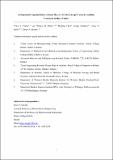| dc.contributor.author | Curley, Clive J. | |
| dc.contributor.author | Dolan, Eimear B. | |
| dc.contributor.author | Otten, Matthias | |
| dc.contributor.author | Hinderer, Svenja | |
| dc.contributor.author | Duffy, Garry P. | |
| dc.contributor.author | Murphy, Bruce P. | |
| dc.date.accessioned | 2019-05-22T11:24:01Z | |
| dc.date.issued | 2018-12-03 | |
| dc.identifier.citation | Curley, Clive J., Dolan, Eimear B., Otten, Matthias, Hinderer, Svenja, Duffy, Garry P., & Murphy, Bruce P. (2019). An injectable alginate/extra cellular matrix (ECM) hydrogel towards acellular treatment of heart failure. Drug Delivery and Translational Research, 9(1), 1-13. doi: 10.1007/s13346-018-00601-2 | en_IE |
| dc.identifier.issn | 2190-3948 | |
| dc.identifier.uri | http://hdl.handle.net/10379/15191 | |
| dc.description.abstract | As treatments for myocardial infarction (MI) continue to improve, the population of people suffering from heart failure (HF) is rising significantly. Novel treatment strategies aimed at achieving long-term functional stabilisation and improvement in heart function post MI include the delivery of biomaterial hydrogels and myocardial matrix-based therapies to the left ventricle wall. Individually alginate hydrogels and myocardial matrix-based therapies are at the most advanced stages of commercial/clinical development for this potential treatment option. However, despite these individual successes, the potential synergistic effect gained by combining the two therapies remains unexplored. This study serves as a translational step in evaluating the minimally invasive delivery of dual acting alginate-based hydrogels to the heart. We have successfully developed new production methods for hybrid alginate/extracellular matrix (ECM) hydrogels. We have identified that the high G block alginate/ECM hybrid hydrogel has appropriate rheological and mechanical properties (1.6 KPa storage modulus, 29 KPa compressive modulus and 14 KPa dynamic modulus at day 1) and can be delivered using a minimally invasive delivery device. Furthermore, we have determined that these novel hydrogels are not cytotoxic and are capable of enhancing the metabolic activity of dermal fibroblasts in vitro (p < 0.01). Overall these results suggest that an effective minimally invasive HF treatment option could be achieved by combining alginate and ECM particles. | en_IE |
| dc.description.sponsorship | AMCARE project funded by European Union’s ‘Seventh Framework’ Programme for research, technological development and demonstration under Grant Agreement no. NMP3-SME-2013-604531. | en_IE |
| dc.format | application/pdf | en_IE |
| dc.language.iso | en | en_IE |
| dc.publisher | Springer Verlag | en_IE |
| dc.relation.ispartof | Drug Delivery And Translational Research | en |
| dc.rights | Attribution-NonCommercial-NoDerivs 3.0 Ireland | |
| dc.rights.uri | https://creativecommons.org/licenses/by-nc-nd/3.0/ie/ | |
| dc.subject | Heart failure | en_IE |
| dc.subject | Acellular hydrogel | en_IE |
| dc.subject | Minimally invasive delivery catheter | en_IE |
| dc.subject | Alginate | en_IE |
| dc.subject | Decellularized | en_IE |
| dc.subject | ECM | en_IE |
| dc.title | An injectable alginate/extra cellular matrix (ECM) hydrogel towards acellular treatment of heart failure | en_IE |
| dc.type | Article | en_IE |
| dc.date.updated | 2019-05-22T07:51:57Z | |
| dc.identifier.doi | 10.1007/s13346-018-00601-2 | |
| dc.local.publishedsource | https://doi.org/10.1007/s13346-018-00601-2 | en_IE |
| dc.description.peer-reviewed | peer-reviewed | |
| dc.contributor.funder | Seventh Framework Programme | en_IE |
| dc.description.embargo | 2019-12-03 | |
| dc.internal.rssid | 15526891 | |
| dc.local.contact | Eimear Dolan, Biomedical Engineering 3031, College Of Engineering & Informa, Nui Galway. Email: eimear.dolan@nuigalway.ie | |
| dc.local.copyrightchecked | Yes | |
| dc.local.version | ACCEPTED | |
| dcterms.project | info:eu-repo/grantAgreement/EC/FP7::SP1::NMP/604531/EU/Advanced Materials for Cardiac Regeneration (AMCARE)/AMCARE | en_IE |
| nui.item.downloads | 868 | |


